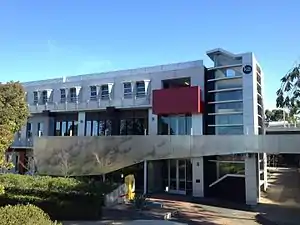Deakin University School of Medicine
Deakin University's School of Medicine is based at the Waurn Ponds campus in Geelong, Victoria, Australia. It offers a four-year, graduate-entry, Doctor of Medicine (MD) degree.
 | |
| Type | Public |
|---|---|
| Established | 2008 |
| Dean | Professor Gary Rogers |
Academic staff | 60 |
Administrative staff | 225 |
| Students | 520 |
| Location | , , |
| Campus | Rural and regional |
| Affiliations | Deakin University |
| Website | http://www.deakin.edu.au/medicine |
 | |
The medical degree is a 4 year course, with 2 years of pre-clinical education at the University campus in Waurn Ponds, and then 2 years clinical education and experience in one of 5 clinical schools.
The School has also developed other new undergraduate and postgraduate programs, namely Optometry, Medical Imaging, Agricultural Health and Medicine, Units in the Bachelor of Biomedical Science and Health Science Majors, Bachelor of Health and Medical Science Honours, and a Masters in Clinical Leadership.
Research
The School of Medicine houses a program of research, including over 100 academic and other research staff as well as nearly 100 research students.
The School's research is centred on four Research Pillars:
- Infection, Immunity & Cancer
- Metabolic & Musculoskeletal Medicine
- Neuroscience
- Rural & Regional Health
Each of the School's Strategic Research Centres, Research Groups and Research Partnerships align closely with one or more of these Research Pillars.
History

On 8 April 2006, the Prime Minister of Australia, John Howard announced that Deakin University would host Victoria's third medical school. Under Prof Brendan Crotty, the first cohort of 120 students commenced their BMBS degree on 7 February 2008.[1]
The School of Medicine was opened on 1 May 2008 by the former Prime Minister of Australia, Kevin Rudd.[2]
In 2011, there were 130 Commonwealth Supported Places available. This figure included 33 Bonded Medical Places and 5 Medical Rural Bonded Scholarships (MRBS).[3]
Teaching hospitals
The first two pre-clinical years of the course are based at the Geelong Campus at Waurn Ponds.
In third and fourth years, students are based at clinical schools located at the following teaching hospitals affiliated with the Deakin University School of Medicine:[4]
- Geelong Hospital (Barwon Health)
- Ballarat Base Hospital (Ballarat Health Services)
- Warrnambool Hospital (South West Healthcare)
- Box Hill Hospital (Eastern Health)
- RCCS Program (Third year only)
Deakin University RCCS Program (rural)
A cohort of students spend all their third year attached to a regional general practice where they complete a 'parallel rural community curriculum' through the Rural Community Clinical School (RCCS). Students cover the same material as those studying in hospital settings. Third year Deakin University medical students in the RCCS program are hosted in general practices in regional and rural Victorian towns including Bacchus Marsh, Daylesford, Colac, Ararat, Camperdown, Casterton, Horsham, Stawell and Hamilton.
Teaching is provided by face-to-face instruction by general practitioners, clinical skills trainers, visiting medical and surgical specialists, online lectures and tutorials. Unlike in the other clinical schools attached to Deakin, the RCCS curriculum follows a Longitudinal Integrated Clerkship (LIC) model.[5] Through this model, rather than cycling through set rotations throughout the year, students encounter a wide range of patient presentations which, with the complementation of online teaching, cover the same content that is encountered through conventional rotation-based learning. [6] Another aspect of the RCCS program is that students perform "parallel consulting" in general practice. This means the student consults one-on-one with a patient, then presents their findings to the supervising doctor. The doctor completes the consultation with the student observing, giving the student opportunities to develop practical clinical skills such as history taking, physical examination, case presentation and medical management. By placing students in rural general practices rather than major metropolitan hospitals, the aim of RCCS is to give students exposure to primary care and country family medicine, with the ultimate objective of encouraging more medical graduates to work in regional Australia, particularly in general practice.
Deakin Medical Students' Association
MeDUSA, the Deakin Medical Students' Association, was established in 2008 to coincide with the entry of the first cohort of students.
References
- Deakin Medical School - Introduction. http://www.deakin.edu.au/medicine/introduction accessed 11 March 2010.
- Media Release: Deakin Medical School opens to help address rural and regional health care needs. http://www.deakin.edu.au/news/upload/010508DMSofficialopening1.pdf Archived 5 December 2010 at the Wayback Machine accessed 11 March 2010.
- Deakin Medical School - Admissions. http://www.deakin.edu.au/future-students/courses/course.php?course=H311&stutype=local&keywords=medicine accessed 29 November 2010.
- Deakin Medical School - Locations and Facilities. http://www.deakin.edu.au/hmnbs/medicine/location.php Archived 20 May 2009 at the Wayback Machine accessed 11 March 2010.
- Longitudinal Integrated Clerkship Program at Deakin RCCS. https://bmcmededuc.biomedcentral.com/articles/10.1186/s12909-019-1767-8
- Longitudinal Integrated Clerkship Program. https://www.mededpublish.org/manuscripts/2265Archived+23+October+2021+at+the+Wayback+Machine